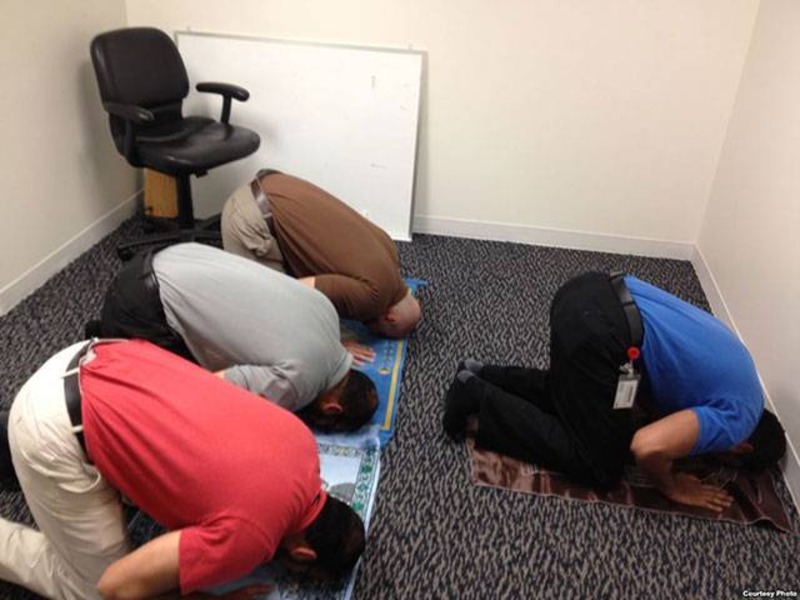A recent ban on prayer spaces in a prominent Hyderabad IT company has led to an uproar, with Muslim employees alleging harassment and discriminatory practices. Several have resigned in protest, citing an intolerant work environment. The incident has sparked widespread criticism, raising concerns over religious freedoms in corporate spaces.
In the bustling IT corridor of Hyderabad’s Hitech City, a controversy is brewing that has far-reaching implications for corporate policies and religious freedoms. At the heart of the storm are the corporate offices in Mindspace Building No. 11, where several companies have barred Muslim employees from offering their prayers within the office premises, citing equal employment opportunity policies. This policy, intended to foster inclusivity, has instead sparked a wave of resignations and allegations of mental harassment among affected employees.
A Brewing Storm: Personal Accounts of Harassment
Shahid Ali, a software engineer at one of the prominent IT firms in Mindspace, had been with the company for over five years. Known for his dedication and technical prowess, Shahid’s performance reviews were exemplary. However, his commitment to his faith became a point of contention. “I was informed that offering prayers at the office was not permissible anymore,” Shahid recounts. “Initially, I tried to comply, but the lack of a designated space and time for prayers began to affect my mental health and work performance.”
Similar stories have emerged from other employees. Ayesha Khan, another software professional, resigned last month after facing continuous pushback for her prayer breaks. “The environment became increasingly hostile. I was constantly reminded that my religious practices were disruptive,” Ayesha shares. “The mental strain was unbearable, and I had no choice but to leave.”
Legal and Ethical Implications: A Complex Balancing Act
India’s constitution guarantees the right to religious freedom, yet the interpretation of this right within corporate policies remains murky. Companies often cite equal employment opportunity (EEO) to justify a neutral stance on religious practices, arguing that providing accommodations for one religion might lead to demands from others.
However, legal experts argue that EEO policies should not infringe upon fundamental rights. “The Constitution clearly provides for religious freedom, and this extends to the workplace,” says Advocate Priya Verma, a legal expert on labor laws. “Corporations need to find a balance that respects both EEO policies and individual religious practices.”
The Toll on Mental Health: Expert Insights
Dr. Sanjay Rao, a clinical psychologist, highlights the severe mental health impact of such policies. “Religious practices often provide emotional and psychological support to individuals. Denying employees the ability to observe their faith can lead to significant stress, anxiety, and feelings of alienation,” he explains.
Company Responses: Official Stance and Employee Pushback
Despite multiple attempts to reach out, most companies involved have remained tight-lipped. One spokesperson, under the condition of anonymity, stated, “We aim to maintain a neutral workspace to ensure inclusivity and avoid favoritism. It’s a difficult balance, but our policies are designed to promote equality.”
This stance, however, has not been well received by employees and advocacy groups. The Indian Human Rights Commission has called for an urgent review of these policies, urging companies to adopt a more inclusive approach that respects religious practices without compromising workplace harmony.
Public Outcry and Call for Action
The issue has sparked significant public outcry. Labor unions and religious groups have organized protests, demanding that companies re-evaluate their policies. Social media platforms are abuzz with hashtags like #RightToPray and #RespectReligiousFreedom, garnering support from across the nation.
“Corporates must recognize that religious freedom is a fundamental right,” asserts Farah Naqvi, a prominent social activist. “This is not just about prayers; it’s about respecting the diverse fabric of our society.”
Towards a Solution: Recommendations and Best Practices
To address this issue, experts recommend several best practices:
- Designated Prayer Rooms: Many companies globally have adopted the practice of providing designated prayer rooms, ensuring that employees can observe their religious practices without disruption.
- Flexible Breaks: Allowing flexible break times can accommodate prayer schedules without affecting productivity.
- Inclusive Policies: Regularly reviewing and updating corporate policies to reflect inclusivity and respect for all religious practices.
A Call for Inclusive Corporate Culture
As the debate continues, the need for a balanced approach that respects religious freedoms while maintaining workplace harmony becomes increasingly clear. The ongoing situation in Mindspace, Hitech City, serves as a wake-up call for the corporate sector in Hyderabad and beyond. It’s a reminder that true inclusivity embraces diversity in all its forms, including religious practices.
In the words of Shahid Ali, “We’re not asking for special treatment, just the right to observe our faith without fear of harassment. It’s time for companies to recognize and respect that.”
Editor’s Take
This investigation into the ongoing crisis in Hyderabad’s corporate sector highlights the urgent need for policies that truly respect and accommodate the religious practices of all employees. The mental health and well-being of employees must be a priority, ensuring a harmonious and inclusive workplace for everyone. #hydkhabar #khabarlive


It’s a Muslim right
When Pooja n idols are allowed in offices n I have seen many companies celebrating festivals in offices , why not prayers allowed ?????
Thanks
I believe most of the people doesn’t have any issue with prayers, unless there’s a hidden motive of politics in offices.
[…] scheduling company events around major religious festivals of the dominant religion or having prayer spaces that cater exclusively to one religious […]
Management needs some counselling, equal employment opportunity doesn’t mean religion intolerance!!